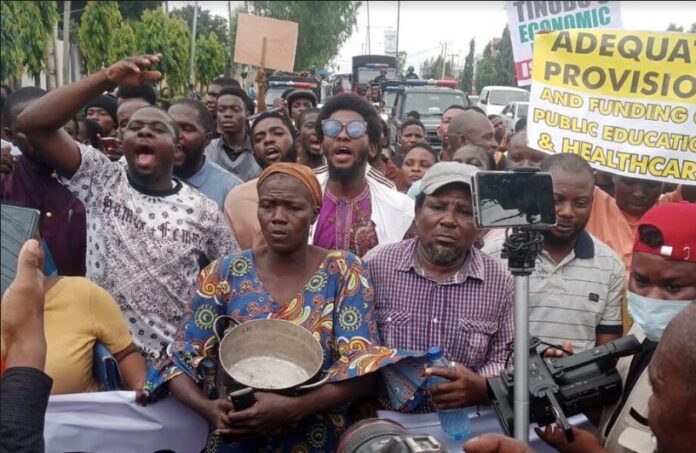The Nigerian police have come under fire after a report by Amnesty International accused them of using excessive force during the #EndBadGovernance protests.
According to the report titled “Bloody August: Nigerian Government’s Violent Crackdown on #EndBadGovernance Protests”, at least 24 people were killed between August 1 and 10, 2024.
Amnesty International stated that victims included 20 youths, an elderly person, and two children.
The protests, sparked by frustration over corruption and economic hardship, took place in several states, including Borno, Kaduna, Kano, Katsina, Jigawa, and Niger.
Eyewitnesses described scenes of chaos as police opened fire on peaceful demonstrators.
In Kano State alone, 12 protesters were reportedly shot dead at Rijiyar Lemo and Kofar Nasarawa.
Three people were killed in Jigawa State, while one person lost their life in Katsina.
Kaduna State also recorded deaths, with one minor reportedly killed in Zaria.
In Maiduguri, three protesters were shot at Bolori Junction.
Niger State saw at least three deaths along the Abuja-Kaduna Expressway.
Amnesty International’s Director in Nigeria, Isa Sanusi, condemned the actions of the security forces.
“People in Nigeria witnessed unbelievable lawlessness as security personnel fired live ammunition at protesters,” Sanusi said.
He added that the death toll could be higher due to alleged cover-ups by the authorities.
“The Nigerian government must ensure justice for victims and hold those responsible accountable,” Sanusi insisted.
Amnesty’s report detailed how victims were shot at close range, often in the head or torso, suggesting a deliberate intent to kill.
Some protesters who survived were left with life-altering injuries.
Two survivors recounted being shot in the arms and legs.
Others were suffocated by tear gas fired indiscriminately into crowds.
The organization also highlighted the arrest and detention of over 1,200 protesters, including minors.
Among those detained was Khalid Aminu, who described horrific conditions in custody.
“I was tortured for over 60 days. They beat me with sticks and iron cables,” Aminu said.
Another protester, Michael Adaramoye, popularly known as Lenin, was detained for two months.
Despite mounting evidence, including eyewitness accounts, videos, and medical reports, the Nigerian police have denied responsibility.
They dismissed the allegations as “fake news” and blamed the deaths on “unknown gunmen.”
Sanusi criticized these denials, calling them “disturbing” and a sign of impunity.
“The police’s refusal to acknowledge these killings undermines trust and perpetuates violence,” he said.
Amnesty’s report also noted that protesters who expressed support online were targeted and arrested.
The protests, initially peaceful, turned violent after police attacks, eyewitnesses said.
Videos and photographs gathered by Amnesty showed police firing live ammunition and tear gas without provocation.
The organization stressed that these actions violated international human rights laws.
According to the UN Basic Principles on the Use of Force, law enforcement officials must avoid using firearms against peaceful assemblies.
Deadly force should only be used when strictly unavoidable to protect life.
Sanusi urged the government to investigate the killings and ensure justice for victims.
“Deadly crackdowns on peaceful protests must end. The Nigerian government must comply with its legal obligations,” he said.
The protests were driven by widespread anger over the rising cost of living and alleged corruption in government.
Amnesty’s findings have reignited calls for police reform and accountability.
Nigerians on social media have expressed outrage over the report’s findings.
Many are demanding justice for those killed and the release of detained protesters.
Human rights advocates say the report highlights a long-standing culture of impunity within Nigeria’s security forces.

